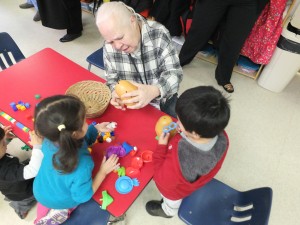Participation soars to more than 200 early learning professionals in 2015 – creating opportunity for the current and future workforce
Wilmington, DE – Recognizing the commitment early learning professionals across the state have made to increasing their own education and to raising the quality of teaching and care they provide to young children, Governor Jack Markell and Secretary of Education Steven Godowsky joined Delaware Early Childhood Council Chair Mary Kate Mouser and other leaders to celebrate the achievements of the more than 200 early childhood professionals who participated in the T.E.A.C.H. Early Childhood® program in 2015.
“The T.E.A.C.H. program is a great public-private partnership that creates opportunity for our teachers to receive advanced education, which leads to higher wages and helps them gain more skills to serve our state’s youngest learners,” said Markell.
Speaking at a joint meeting of the Delaware Early Childhood Council and Wilmington Early Care and Education Council, Governor Markell and Secretary Godowsky honored more than a dozen scholars and early learning programs for participating in T.E.A.C.H., which provides scholarships to early learning professionals for college coursework leading to a credential or degree in early childhood.
“The work you do in partnership with families is helping to physically shape the brain architecture of our youngest children and laying the foundation for all of their future learning,” Markell continued. “I applaud you and the more than 200 early learning professionals who, despite having full-time jobs and families of their own to care for, have gone back to school to earn early childhood degrees.”
Most T.E.A.C.H. scholars are women earning less than $15 per hour –76% of whom are married with children. Nearly half of the scholars are people of color and 41% are the first family member to attend college. The state funds the T.E.A.C.H. scholarships, centers commit to providing a bonus or raise to the teacher once the coursework is completed, and in return teachers commit to successfully completing coursework and to remaining in the same early childhood program.
“The T.E.A.C.H. program has had a huge impact on my life both personally and professionally. I have earned an Associate’s Degree in Early Childhood Education and am currently working toward my Bachelor’s. Many of the staff employed at my center have also become T.E.A.C.H. scholars and are furthering their education,” explained Krista Thomas, a teacher and now Assistant Director at Expanding Our Kid’s World, a 5 Star rated center in Smyrna.
Godowsky lauded the teachers for seeking opportunities to further their education and professional development to continue to provide their students with a quality early education: “Just as great teaching is key to great learning when children reach school age, quality teaching and early education is critical to the development of our youngest learners.”
The Delaware Association for the Education of Young Children (DAEYC) is licensed to operate the national T.E.A.C.H. program for the state, which served a total of 209 early learning professionals in 2015. Of those, 128 were working towards an Associate’s degree, 52 were seeking a Bachelor’s, and the rest were working on national credentials or certificates. On average, the increase in wages for Associate and Bachelor degree scholars was 7.5%.
“T.E.A.C.H. embodies the core principles that drive the Early Childhood Council’s work –collaboration, evidence-based, and outcome driven,” said Mary Kate Mouser, Council Chair and Operational Vice President of Nemours Health and Prevention Services. “The state’s community colleges and four-year institutions, DAEYC, and early learning programs including private child care centers and homes, Head Start and Early Head Start have all embraced T.E.A.C.H. to make it a success.”
T.E.A.C.H. is one of many successful early learning initiatives that have been accelerated since 2011 when, despite budget challenges, Governor Markell proposed and the General Assembly passed a $22 million to increase early childhood funding by one third, and the state subsequently received a competitive federal four-year, $50 million dollar Early Learning Challenge grant which will expire in 2016.
As a result of these investments:
- Increased Stars participation by more than 300% in the past four years so that 550 early learning programs are now participating in Delaware Stars for Early Success, which helps early learning programs improve quality and assigns a 1 to 5 Star rating to help families make child care choices.
- More than 58 percent of low-income children in child care are enrolled in highly rated Stars programs, up from just 5 percent in 2011.
- Over 28,000 young children have received developmental screenings – moving the state from last in the nation to 21st in the percent of young children receiving these screenings, which are critical for identifying and addressing developmental problems as early as possible.
- More than 2,400 children received intensive Early Childhood Mental Health Consultation services, reducing behavioral challenges and achieving a 99% success rate in avoiding preschool suspensions.
“I am proud of the progress Delaware has made in raising the quality of early learning programs and supporting children’s healthy development. The Council is committed to providing leadership for the policies, programs and investments needed to sustain and grow this progress in 2016 and beyond,” concluded Mouser.
According to research, children who experience quality early learning programs start school more ready to succeed and are healthier, more self-sufficient and less likely to enter the criminal justice system over their lifetimes.
###
